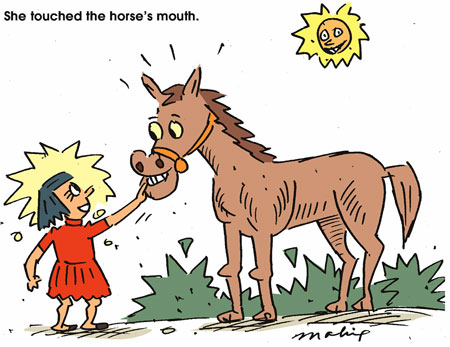|

by R. S. Karunaratne
Punctuation marks
[Part 3]
Ellipsis ( ... )
Ellipses (plural) are series of full stops usually, three. They are
sometimes referred to as omission marks. We use an ellipsis to suggest
that something is missing or omitted or withheld from the text. It can
be used in the middle or at the end of a sentence.

Who the ... does she think she is?
Sometimes we use an ellipsis to leave something for the reader’s
imagination.
The couple sat under a tree by the river whispering sweet nothings ...
We use an ellipsis to indicate an incomplete quotation.
I promise to tell the truth, the whole truth and nothing but ...
Note: When we use an ellipsis at the end of a sentence, there is no
need to add a full stop.
Novelists and short story writers use the ellipsis to indicate a
halting dialogue.
The beggar stretched his hand and said ... I ... had ... for two days.
Quotation marks (“ ”‘ )
Quotation marks, also known as “quotes”, “inverted commas” or “speech
marks,” come in pairs, one to open and the other to close the quotation.
We use quotation marks to indicate direct speech.
“Where’s the child?” the police officer asked me.
We use quotation marks to highlight particular words or phrases.
Danny calls himself a “filmologist,” whatever that means.In the past
we talked about “slow learners” but today they are referred to as
“children with special needs.”
We use quotation marks to indicate titles of short stories, poems,
chapters, articles and essays.
Have you read the poem titled “Ozymandias”?
I have to study John Milton’s “Paradise Lost” for my examination.
H. W. Fowler advocated the use of single quotation marks for normal
use and double quotation marks to enclose quotes within quotes. In
modern English, however, quotation marks are used sparingly. When you
first mention a technical or slang word put it within quotation marks.
There is no need to use quotation marks for its subsequent uses.
Apostrophe ( ’ )
We use the apostrophe to indicate the possessive or genitive case. It
also shows the omission of letters in contractions.
Possession
She touched the horse’s mouth.

Are you going to celebrate the Father’s Day?
One’s life is one’s own.
You will be called for an interview in a week’s time.
Have you read William Shakespeare’s Macbeth?
Contractions
I don’t want to be a mechanic.
You’re a nice girl, aren’t you?
Here’s some good news for you.
There’s something on your nose!
We use the apostrophe to indicate an omission.
We still feel the impact of the ‘71 insurrection.
Can you meet me at 2 o’clock?
Note: The word “apostrophe” is derived from the Greek word
“apostrophes” meaning “a turning away.”
The possessive use of the apostrophe + s is found in many place names
and addresses.
My son attends S. Thomas’ College, Mount Lavinia.
The match will take place at Lord’s Cricket Ground.
To be continued

Enrich your vocabulary by learning new words on a regular basis. Do
the following quiz which contains a number of new words. Check your
answers with the key.
1. Felix was the de facto ruler although the head of the government
was one of his relatives.
(a) actual
(b) powerful
(c) appointed
2. Carlyle was known as a bon vivant in the restaurant circles.
(a) one who enjoys spending money
(b) one who enjoys good food
(c) one who is prompt in payment
3. Death and renewal are leitmotivs running through the whole novel.
(a) theme
(b) plot
(c) a feature repeated
4. Dr Lester James Peries is a film-maker par excellence.
(a) beyond comparison
(b) average
(c) mediocre
5. After winning Rs 2 million in the lottery, the parvenu is now
putting up a palatial building.
(a) imposter
(b) millionaire
(c) somebody from a low social position who has suddenly become rich.
6. The piece de resistance in the magic show came when the magician
sawed a woman into two parts.
(a) the last item
(b) the main item
(c) the first item
7. The guests gathered on the porch for postprandial drinks.
(a) after dinner
(b) after breakfast
(c) after lunch
8. In politics, the term for a quid pro quo is “log-rolling.”
(a) compensation
(b) one thing in return for another
(c) nepotism
9. The new company is going to hire young people who are on the qui
vive.
(a) dole
(b) jobless queue
(c) on the lookout
10. I am sorry I left you off the list - it wasn’t intentional.
(a) done on purpose
(b) accidental
(c) fair
Key:
1. (a), 2. (b), 3. (c), 4. (a), 5. (c), 6. (b), 7. (a), 8. (b), 9.
(c), 10. (a)
Starters:
Use of ‘the’ with names of places
Usually, we do not use ‘the’ with names of places.
I was born in Colombo.
Sri Jayewardenepura is the capital of Sri Lanka.
Sri Lanka is an island in the Indian ocean.

Australia is a continent.
Nugegoda is a suburban town.
However, we use ‘the’ before “republics, states, kingdoms, or
unions.’
The author lived in the Republic of Ireland.
The United States of America is a powerful country.
The students left for the United Kingdom for higher studies.
Have you visited the United Arab Emirates?
We do not use ‘the’ with names of streets, squares, airports,
stations, universities and castles.
We live in Main Street, Panadura.
Where’s Galle Road?
Trafalgar Square is in London.
How far is Katunayake Airport from Colombo?
Fort Railway Station is always crowded.
The queen lived in Edinburgh Castle.
He is a graduate of Peradeniya University.
We are going to visit Westminster Abbey.
The children are going to visit Dehiwala Zoo.
We use ‘the’ with names of hotels, restaurants, pubs, cinemas,
theatres and museums.
Lake House is situated close to the Hilton.
Can you direct me to the National Museum?
The Odeon Cinema is at Mount Lavinia.
Have you visited the Tate Gallery?
We use ‘the’ with names of rivers, oceans, seas and canals.
We are surrounded by the Indian ocean.
They are sailing across the Atlantic ocean.
The Mahaweli is the longest river in Sri Lanka.
Egypt owns the Suez Canal.
Can you name an island in the Mediterranean Sea?
We use ‘the’ with names with ‘of.’
The Great Wall of China is a wonderful creation.
She is an employee of the Bank of Ceylon.
I haven’t seen the Tower of London.
He has been to the south of Sri Lanka but not to the north.
We use ‘the’ with plural names of countries, islands and mountain
ranges.
We import milk powder from the Netherlands.
Many hermits are believed to be living in the Himalayas.
[Activity]
Put in ‘the’ where necessary. If the sentence is correct, write
‘okay’ on the dotted line. Check your answers with the key.
1. Radha lives in Flower Street.
................................................
2. Have you ever been to Tower Hall?
................................................
3. Many tourists are staying at Hotel Swiss.
................................................
4. Matara is a large city in south of Sri Lanka.
................................................
5. Sri Jayewardenepura is capital of Sri Lanka.
................................................
6. National Museum is in Colombo 7.
................................................
7. Most star-class tourist hotels are found in Hikkaduwa.
................................................
8. In London, Houses of Parliament are beside River Thames.
................................................
9. What is capital of Russia?
................................................
10. Have you ever been to United States?
................................................
Key:
1.Okay
2. Have you ever been to the Tower Hall?
3. Many tourists are staying at the Hotel Swiss.
4. Matara is a large city in the south of Sri Lanka.
5. Sri Jayewardenepura is the capital of Sri Lanka.
6. The National Museum is in Colombo 7.
7. Okay
8. In London, the Houses of Parliament are beside the River Thames.
9. What is the capital of Russia?
10. Have you ever been to the United States?
Commonly misspelt words
Familiarize yourself with the following words commonly misspelt by
starters. Some hints are given wherever possible.
1. absence
It has a single ‘s’ and a single ‘c’. The ‘s’ comes before the ‘c’.
2. abysmal (extremely bad)
The vowel sound you get after the ‘b’ is spelt with a ‘y’.
3. accede (to take a high position)
Remember the ending ‘cede.’
4. ache
There is an ‘e’ at the end.
5. acknowledge
The second syllable is spelt ‘know.’
6. adequate
The vowel after the ‘d’ is ‘e’, not ‘i’.
7. advantageous
Remember to put an ‘e’ after the ‘g’.
8. advertisement
Note the ‘e’ after the ‘s’.
9. aerial (from aircraft or the air)
Remember the word ‘aeroplane’.
10. aesthetic (concerned with beauty)
Remember to put an ‘a’ before the ‘e’.
11. anaesthetic (a substance that makes a person or animal unable to
feel pain)
There is an ‘a’ before the ‘e’. However, the American spelling is
‘anesthetic’.
12. analysis
The final vowel is ‘i’.
13. annihilate (to destroy somebody or something)
It has two ‘n’s followed by an ‘i’.
14. anonymous (with a name that is not known or not made public)
The ending is ‘ous’.
15. anxious (feeling worried or nervous)
There is an ‘i’ after the ‘x’.
16. apology (a word or statement to say one is sorry for having done
something wrong)
The ‘p’ and ‘l’ are followed by ‘o’.
17. architect (a person who designs buildings)
Remember to put an ‘h’ after the ‘c’.
18. argue
It ends in ‘ue’.
19. atheist ( a person who believes that there is no God)
Note the ‘ei’ in the middle.
20. attendance
It ends in ‘ance’, not ‘ence’. Remember the word ‘dance’.
21. atrocious ( very wicked)
It ends in ‘cious’.
22. auxiliary (giving help or support)
The single ‘l’ is followed by ‘i’.
23. awful (extremely bad or unpleasant)
There is no ‘e’ after the ‘w’.
24. bachelor (a man who is not married)
There is no ‘t’ before the ‘ch’.
25. barbecue (a metal frame for cooking meat over an open fire)
It can be spelt ‘barbeque’ but ‘barbecue’ is preferable.
26. because
It ends in ‘se’ not ‘ce’.
27. beggar
It ends in ‘ar’ not ‘er’.
28. berserk (out of control with anger)
Note the ‘er’, ‘er’ combination.
29. boundary (a line that makes a limit)
Remember to put an ‘a’ after the ‘d’.
30. breadth (the distance from side to side)
There is a ‘d’ before the ‘th’. |

